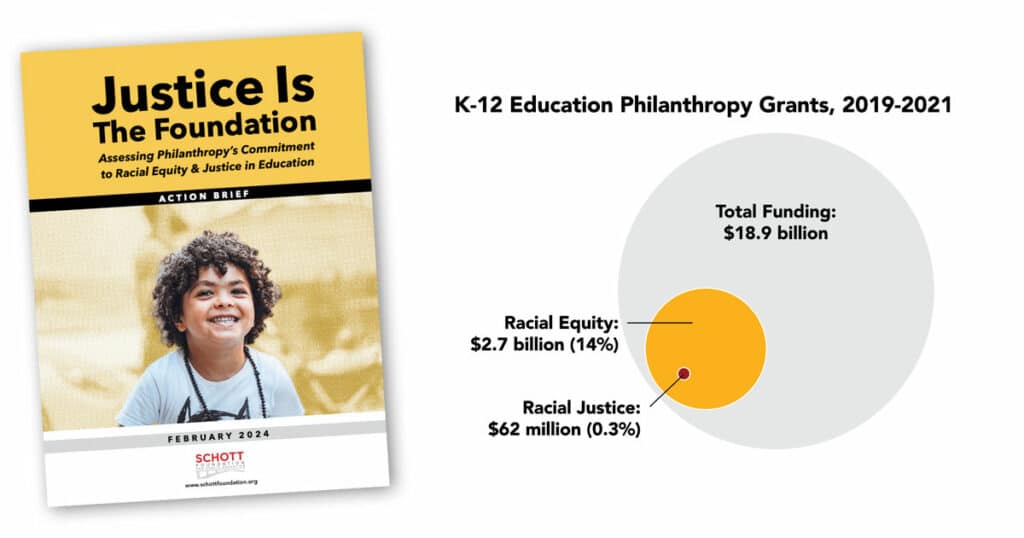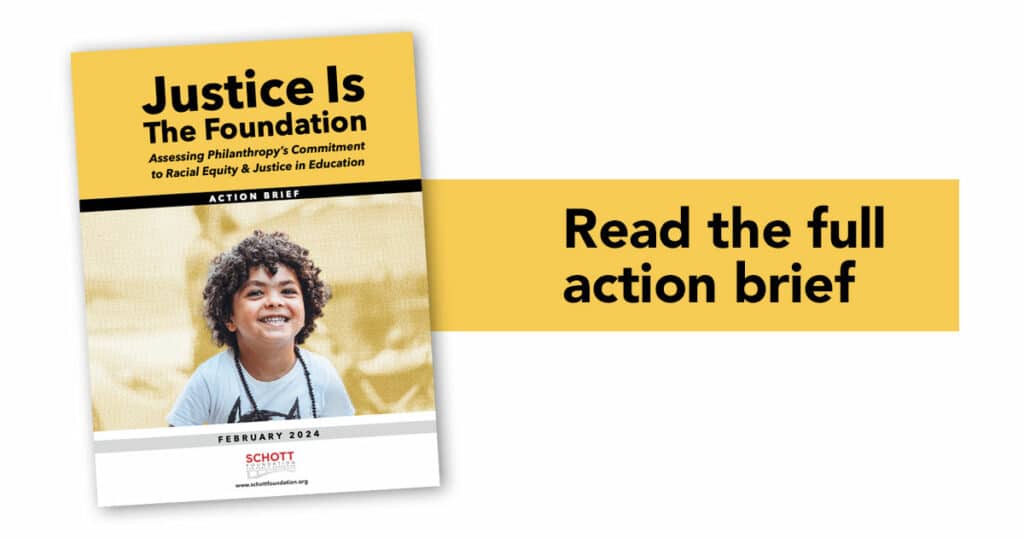Press Release
New Report Finds That Education Philanthropy is Retreating from Funding Racial Equity & Justice Work in the Moment it’s Needed Most

Today, the Schott Foundation for Public Education released the third edition of Justice Is The Foundation, which analyzes grantmaking data across K-12 education philanthropy.
As outlined in the action brief, the data paints a stark picture: despite a chorus of funders committing to changing their grantmaking practices amid the racial justice protests of 2020, grant dollars awarded to racial equity and racial justice work have declined compared to the period before it.
In addition, Schott’s brief provides a number of starting points for those interested in making the necessary changes in their grant strategies.
Below are key findings from the data:
- Both racial equity and racial justice remain drastically underfunded by the K-12 philanthropic sector. The stubborn refusal of the sector to ramp up investment over the past decade is all the more stark given that U.S. schools are now majority students of color.
- K-12 education philanthropy’s already scant investment in racial justice dropped sharply compared to 2018-2020. The $62 million recorded in 2019-2021 — just 0.3% of grantmaking — pales in comparison to the still-meager $105 million (0.7%) in 2018-2020. Given the monumental task of addressing and solving structural racism in our schools and wider society, this funding inadequacy cannot be overstated.
- Geographically, K-12 racial equity and justice grants are not properly flowing to where students of color are found. Both sets of grants have recipients disproportionately concentrated in the Northeast, despite the fact that almost half of all K-12 students, and the majority of all students of color, are enrolled in the South.

The Schott Foundation for Public Education has worked in close partnership with Candid to obtain and analyze grants in the sector and determine accurate and workable definitions of racial equity and racial justice that could be mapped onto reported grant data.
Racial equity in the report refers to grants designed to close the achievement gap that persists between racial groups. Grants for racial equity include support for programs such as racial bias trainings for teachers or mentorship programs for Black and brown students. designed to address the larger systemic issues creating barriers to the ecosystem necessary to close opportunity gaps.
Racial justice grants, a subset of racial equity grants, focus explicitly on empowering people closest to the problem (students, families, school staff and community) organizing in their communities to change the systems and structures that generate and reinforce racial inequity.
Amid renewed attacks across the country against racially inclusive curriculum, hiring practices, and enrollment, now is the moment for racial equity funders to meet the demands of the moment and dramatically increase their grantmaking in racial equity and justice work in education.
The action brief provides a number of starting points for those interested in making the necessary changes in their grant strategies.
“Educators and students know that the schoolhouse sits at the intersection of some of the most pressing issues of our day: housing, fair wages, access to mental and health care, environmental justice, voting rights and more,” said Dr. John H. Jackson, President & CEO of the Schott Foundation for Public Education. “We call on philanthropy to respond to this historic moment and opportunity by making transformative investments in racial equity and justice work.”
For more than 30 years, Schott has held to the principle that systemic injustice requires systemic solutions rooted in the communities most impacted. As a public fund that supports the education justice movement, the Schott Foundation collaborates with philanthropic partners to provide resources and strategic support for grassroots organizations across the country advancing racial justice, gender equity, and LGBTQ rights in public education. Learn more in our 2023 impact report.


